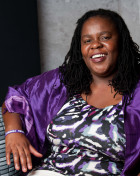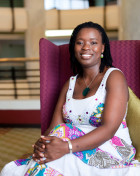I am a daughter of the African soil. My home is Zimbabwe. I live with my mother who is in her 60s. It is one of the daily delights of my present life to be able to enjoy a very close and loving relationship with my mother and to harmoniously share a home with her. My mother, through the magical space of her womb was my first home. I am priviledged that she is my present home. It has not always been that way, and I am grateful that we have been given this time together.
I am a writer, this comes from the many years in the public and private media. And, I am an feminist activist, this comes from being in civil society institutions that had a mission and vision that I shared. I have been very fortunate so far to have a career path that has given me a space and a platform from which to organise these talents and gifts into a sense of service that reads as a fairly reasonable professional resume, because it comes with the generosity of a title that the corporate bureaucracy can organise. For me, it has always been a place from where I can have some structure and resources to be of service to communities where there is work to be done. Maybe one day I can be courageous enough to just say if I have to roll up my sleeves and work, I get work done.
I learned feminism in our home and family from my mother and my grandmother. It just wasn’t called or named Feminism, be that with a capital F or just an f. My mother and my grandmother have, to me been the most beautiful women I have ever known. I saw them show solidarity and sisterhood to women within and outside of our family circles and this left me in awe. It gave me a sense of purpose. All I am I owe to these women of my family and many other women who have been generous with experience and counsel in the three or so decades of my life. Women from near and far who have shared their wisdom and strength with me and for me, in ways that are expressed formally and in ways that have been unexpressed, but understood. I attribute any part of my character that is positive, that is lived in a way that demonstrates feminist thought, emotion and action to my mother and my grandmother and my community of sisters. It may sound trite to someone reading this in the 21st century, an age of constitutional equality, the world wide web and other forms of civil and political liberty, but for me to sit on the laps of black African women who stepped out of the devastating confines of the forms of racisms and sexisms that the very ugly infrastructure and legalized reality if colonization, combined with the oppressive components of our Africanness is nothing short of astounding.
For women in my world, that have in any way had our humanness undermine, we value what it means to be raised by educated, professionally skilled, wage earning and tax paying professionals who have their own bank accounts, in their own names, have their own minds and hearts, and control and ownership of their bodies. This is an extraordinary achievement.
I aspire to a time when I can present my feminism with the wisdom, grace an art that I witnessed in their kitchens, bedrooms, bathrooms, gardens, plough fields, places of worship and public life. When I can express this sense of resistance and liberation in and with a collective of others who believe that to be a full human being rather than a dog (no disrespect to animal rights activists). When I arrive at this point in my life, then I can say my precious matriarchal inheritances have been honoured, and then I can sit back and exhale. Anything in my character that resembles less than this ‘Queendom’ as the rap diva Latifah names it, is me, is my shortcoming. So for now, I continue to learn, to error, to relearn and to commit to growing.




